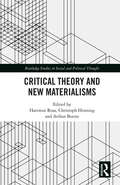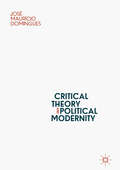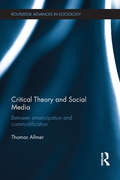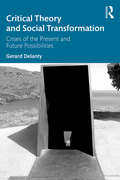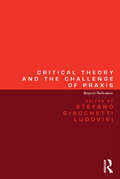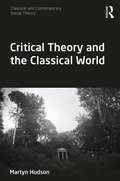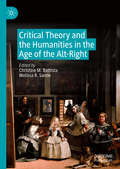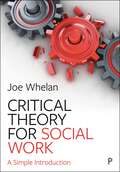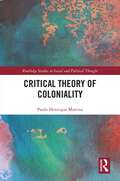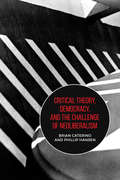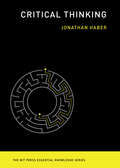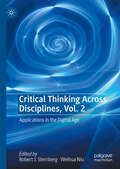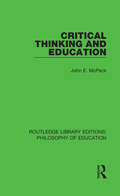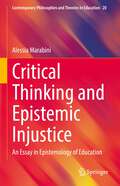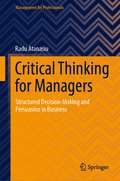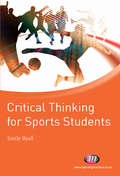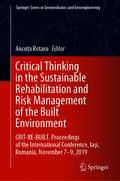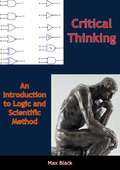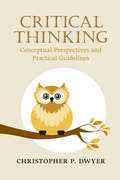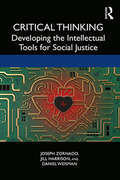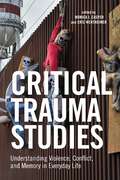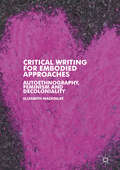- Table View
- List View
Critical Theory and New Materialisms (Routledge Studies in Social and Political Thought)
by Hartmut Rosa; Christoph Henning; Arthur BuenoBringing together authors from two intellectual traditions that have, so far, generally developed independently of one another – critical theory and new materialism – this book addresses the fundamental differences and potential connections that exist between these two schools of thought. With a focus on some of the most pressing questions of contemporary philosophy and social theory – in particular, those concerning the status of long-standing and contested separations between matter and life, the biological and the symbolic, passivity and agency, affectivity and rationality – it shows that recent developments in both traditions point to important convergences between them and thus prepare the ground for a more direct confrontation and cross-fertilization. The first volume to promote a dialogue between critical theory and new materialism, this collection explores the implications for contemporary debates on ecology, gender, biopolitics, post-humanism, economics and aesthetics. As such, it will appeal to philosophers, social and political theorists, and sociologists with interests in contemporary critical theory and materialism.
Critical Theory and Political Modernity
by José Maurício DominguesThis book draws together philosophy, jurisprudence, political science, and international relations to study the main categories of political modernity and its development trends. Grounded in critical theory—from Marx to later currents such as the Frankfurt School—Critical Theory and Political Modernity circulates around state power and oligarchy as well as emancipatory possibilities from their foundations to the present, such as radical democracy. Domingues analyzes the main categories of political modernity, including the juridical dimension, to conceptually articulate its long-term processes of development. In so doing, he examines rights, law and citizenship, state and domination abstract and concrete, the political system, state power, freedom and autonomy, scalar configurations, political regimes, oligarchy and democracy.
Critical Theory and Social Media: Between Emancipation and Commodification (Routledge Advances in Sociology)
by Thomas AllmerSocial media platforms such as Facebook, YouTube, and Twitter are enormously popular: they are continuously ranked among the most frequently accessed websites worldwide. However there are as yet few studies which combine critical theoretical and empirical research in the context of digital and social media. The aim of this book is to study the constraints and emancipatory potentials of new media and to assess to what extent digital and social media can contribute to strengthen the idea of the communication and network commons, and a commons-based information society. Based on a critical theory and political economy approach, this book explores: the foundational concepts of a critical theory of media, technology, and society users’ knowledge, attitudes, and practices towards the antagonistic character and the potentials and risks of social media whether technological and/or social changes are required in order to bring about real social media and human liberation. Critical Theory and Social Media examines both academic discourse on, and users’ responses to, new media, making it a valuable tool for international scholars and students of sociology, media and communication studies, social theory, new media, and information society studies. Its clear and interesting insights into corporate practices of the global new media sector will mean that it appeals to critical social media users around the world.
Critical Theory and Social Transformation: Crises of the Present and Future Possibilities
by Gerard DelantyCritical Theory and Social Transformation provides an exploration of the major themes in critical social theory of recent years. Delanty argues that a critical theory perspective can offer much-needed insights into the pressing socio-political challenges of our time. In this volume, he advances the need to reconnect social theory and social research and to return to the foundational concerns of critical social theory. Delanty engages with the key topics facing critical social theorists: capitalism, cosmopolitanism, modernity, the Anthropocene, and legacies of history. The connecting thread is that the topics are all contemporary challenges for critical theory and relate to major social transformations. The notions of critique, crisis, and social transformation are central to the book. Critical Theory and Social Transformation will be of interest to the broad readership in social and political theory. It will appeal to those working in sociology, political sociology, politics, and international studies and to anyone with an interest in any of the chapter-specific topics, such as public space, memory, and neo-authoritarianism.
Critical Theory and the Challenge of Praxis: Beyond Reification
by Stefano Giacchetti LudovisiThis volume explores possibility of constructing a political outcome from the theory of the early years of the Frankfurt School, countering the commonly-made criticism that critical theory is highly speculative. With chapters exploring the work of figures central to the Frankfurt School, including Benjamin, Adorno, Horkheimer, Marcuse, Habermas and Honneth, Critical Theory and the Challenge of Praxis reveals that it is only with a fixed and dogmatic model of politics that critical theory is incompatible, and that it can in fact yield a rich variety of political models, ranging from new forms of Marxism to more contemporary ’dialogical’ models centred on the politics of identity. With attention to new ways of contrasting alienation and reification in contemporary forms of social organisation, this book demonstrates that the thought of the Frankfurt school can in fact be an invaluable tool not only for developing a critique of advanced capitalism, but also for originating alternative models of political praxis. As such, it will appeal to scholars of social and political theory, with interests in classical sociological thought and continental philosophy.
Critical Theory and the Classical World (Classical and Contemporary Social Theory)
by Martyn HudsonThis book radically re-examines Europe’s imaginaries of its origin in the ancient Greek world. Extracting central concepts of critical theory in its widest sense - beyond the Frankfurt School - like the human, force, spirit and domination, it allies them to characters, mythologies and motifs in ancient thought. Just as the stories of Achilles, Helen and Odysseus have become central to our modes of self-understanding, so we can also examine the roots and routes of the concepts of social theory out of the ancient earth and its myths. An important book for scholars and students of critical theory, social theory, aesthetic theory and the history of the human sciences, it alerts us to the catastrophe that we are facing in the 21st century - a catastrophe of domination and ecological collapse that has its origins in the ancient world and the ways in which it began to define a certain sense of humanness. Considering the artistic production of the ancient world in relation to the thought of Adorno, Critical Theory and the Classical World argues that it is only by understanding the persistence of the haunted motifs of the past into the present that we can begin to re-forge our critical theory of society and re-found our social formations on a new basis.
Critical Theory and the Humanities in the Age of the Alt-Right
by Christine M. Battista Melissa R. SandeThis edited collection uses critical theory in order to understand the rise of the Alt-Right and the election of Donald Trump—and, in doing so, to assert the necessity and value of various disciplines within the humanities. While neoliberal mainstream culture has expressed shock at the seemingly expeditious rise of the Alt-Right movement and the outcome of the 2016 United States presidential election, a rich tradition of theory may not only explain the occurrence of this “phenomenon,” but may also chart an alternative understanding of the movement, revealing the persistence of right-wing populism throughout the twentieth and twenty-first centuries. Though the humanities have seen themselves undervalued and under attack in recent years, the historical and cultural contextualization of the current moment via theory is a means of reaffirming the value of the humanities in teaching the ever-important and multifaceted skill of critical literacy. This book re-affirms the humanities, particularly the study of literature, theory, and philosophy, through questions such as how the humanities can help us understand the here and now.
Critical Theory for Social Work: A Simple Introduction
by Joe WhelanCovering a range of important social theorists – from W.E.B. Du Bois to Judith Butler – this accessibly written textbook encourages critical thinking and critical approaches to social work, providing an entry point for anyone interested in thinking theoretically about practice. Key features include: • essential terms explained throughout; • end-of-chapter prompts to promote further thinking from students; • suggestions for further reading complete with commentary; and • companion website with links to videos, a lesson plan and additional resources. Written for introductory audiences and experts alike, this book will appeal to students studying social work or other related social and allied professions at both undergraduate and postgraduate level, as well as practitioners engaged in professional development.
Critical Theory of Coloniality (Routledge Studies in Social and Political Thought)
by Paulo Henrique MartinsThis book reveals how the critique of the domination of capitalism inaugurated by the Frankfurt School becomes pluriversal, motivating the historical Critical Theory of Coloniality (CTC) dialogue between the Global South and the Global North. CTC expresses the emergence and historical actuality of a set of intellectual fields aimed at denouncing domination and promoting emancipatory ideas at the borders of colonial capitalism. The book argues that the actuality of the CTC relies on the importance of valuing theoretical and methodological pluralism in the context of the necessary redefinition of the directions of global society. It reveals a plural reflection of scientific, moral, and aesthetic character in different areas of former planetary colonisation such as Asia, Africa, and America but also on the borders of Europe. This book is aimed at researchers and students in the social sciences as well as in interdisciplinary studies. It is attractive to those who are interested in the plural development of theoretical criticism outside the European universe and who seek to understand how capitalist power has metamorphosed with planetary coloniality. Considering this book implies important reflections on topics such as development, modernity, tradition, imperialism, dependency, and democracy, it is interesting to specialists in development issues, international relations, and policymakers.
Critical Theory, Democracy, and the Challenge of Neoliberalism
by Phillip Hansen Brian CaterinoWith a few exceptions, critical theorists have been late to provide a comprehensive diagnosis of neoliberalism comparable in scope to their extensive analyses of advanced welfare state capitalism. Instead, the main lines of critical theory have focused on questions of international justice which, while no doubt significant, restrict the scope of critical theory by deemphasizing linkages to larger political and economic conditions. Providing a critique of the Frankfurt School, Brian Caterino and Phillip Hansen move beyond its foundations, and call for a rethinking of the bases of critical theory as a practical, freedom-creating project. Outlining a resurgence of neoliberalism, the authors encourage a fresh, nuanced analysis that elucidates its political and economic structures and demonstrates the threats to freedom and democracy that neoliberalism poses; the reformulation of a radical democratic alternative to neoliberalism, one that critically addresses its limitations while promoting an enhancement of communicative and social freedom.
Critical Thinking (The MIT Press Essential Knowledge Series)
by Jonathan HaberHow the concept of critical thinking emerged, how it has been defined, and how critical thinking skills can be taught. Critical thinking is regularly cited as an essential twenty-first century skill, the key to success in school and work. Given our propensity to believe fake news, draw incorrect conclusions, and make decisions based on emotion rather than reason, it might even be said that critical thinking is vital to the survival of a democratic society. But what, exactly, is critical thinking? In this volume in the MIT Press Essential Knowledge series, Jonathan Haber explains how the concept of critical thinking emerged, how it has been defined, and how critical thinking skills can be taught and assessed.Haber describes the term's origins in such disciplines as philosophy, psychology, and science. He examines the components of critical thinking, including structured thinking, language skills, background knowledge, and information literacy, along with such necessary intellectual traits as intellectual humility, empathy, and open-mindedness. He discusses how research has defined critical thinking, how elements of critical thinking have been taught for centuries, and how educators can teach critical thinking skills now.Haber argues that the most important critical thinking issue today is that not enough people are doing enough of it. Fortunately, critical thinking can be taught, practiced, and evaluated. This book offers a guide for teachers, students, and aspiring critical thinkers everywhere, including advice for educational leaders and policy makers on how to make the teaching and learning of critical thinking an educational priority and practical reality.
Critical Thinking Across Disciplines, Vol. 2: Applications in the Digital Age
by Robert J. Sternberg Weihua NiuThis edited collection takes a multidisciplinary approach to critical thinking, drawing together leading experts to examine its application to contemporary societal issues including AI, misinformation, and health communication. Where Volume 1 initiated a dialogue between disciplines to enable a deeper understanding of critical thinking, Volume 2 considers how we might best apply critical-thinking skills to meet challenges in our everyday lives. Drawing together leading experts from disciplines including psychology, philosophy, education, and creativity studies, the book&’s authors consider topics ranging from conspiracy beliefs and bio-ethics, to multiculturalism and social justice. This compelling work offers fresh insights for students, scholars and those with a general interest in the application and development of critical thinking skills.
Critical Thinking and Education: Dialogue And Dialectic (Routledge Library Editions: Philosophy of Education #12)
by John E. McPeckThe skills of ‘critical thinking’ occupy a contentious place in debates on education. It is of course widely recognised that education must consist of more than an unreasoning accumulation of facts and skills, and that modern society demands a highly-developed critical awareness to cope with its ever-increasing complexities. Yet the very term ‘critical thinking’ threatens to become a vague and unexamined slogan, displayed more in party tricks than in useful knowledge. In this book, first published in 1981, Professor McPeck offers a critique of the major ideas and important work in the field, including those of Ennis and de Bono, while at the same time presenting his own rigorous ideas on the proper place in critical thinking in the philosophy of education. The book aims to establish a sound basis on which the role of critical thinking in schools can be evaluated and the author makes a strong case for the contribution it can make to resolving current dilemmas of the curriculum.
Critical Thinking and Epistemic Injustice: An Essay in Epistemology of Education (Contemporary Philosophies and Theories in Education #20)
by Alessia MarabiniThis book argues that the mainstream view and practice of critical thinking in education mirrors a reductive and reified conception of competences that ultimately leads to forms of epistemic injustice in assessment. It defends an alternative view of critical thinking as a competence that is normative in nature rather than reified and reductive. This book contends that critical thinking competence should be at the heart of learning how to learn, but that much depends on how we understand critical thinking. It defends an alternative view of critical thinking as a competence that is normative in nature rather than reified and reductive. The book draws from a conception of human reasoning and rationality that focuses on belief revision and is interwoven with a Bildung approach to teaching and learning: it emphasises the relevance of knowledge and experience in making inferences.The book is an enhanced, English version of the Italian monograph Epistemologia dell’Educazione: Pensiero Critico, Etica ed Epistemic Injustice.
Critical Thinking for Managers: Structured Decision-Making and Persuasion in Business (Management for Professionals)
by Radu AtanasiuThis book discusses critical thinking as a tool for more compassionate leadership, presenting tried and tested methods for managing disagreement, for anticipating and solving problems, and for enhancing empathy. Employing a lighter tone of voice than most management books, it also shows how and when less-than-rational mechanisms such as intuition and heuristics may be efficient decision-making tools in any manager’s toolbox. Critical thinking is useful for analyzing incoming information in the context of decision-making and is crucial for structuring outgoing information in the context of persuasion. When trying to convince a client to buy a service, an executive board to fund a project, or a colleague to change a procedure, managers can use the simple step-by-step guides provided here to prepare for successful meetings and effective pitches.Managerial thinking can be steadily improved, using a structured process, especially if we learn to think about our thinking. This book guides current and would-be managers through this process of improving and metathinking, in connection with decision-making and persuasion. Using examples from business, together with research insights from Behavioral Economics and from Management and Organizational Cognition, the author illustrates common pitfalls like hidden assumptions and cognitive biases, and provides easy-to-use solutions for testing hypotheses and resolving dilemmas.
Critical Thinking for Sports Students (Active Learning in Sport Series)
by Emily RyallA really useful textbook to help undergraduate students construct arguments in their writing, and raise their writing abilities to a higher level. The book also provides useful examples that relates to sports students. - Hassan Khalil, Hertfordshire University "A fantastic text and one we use regularly with undergraduate and postgraduates." - Abbe Brady, Gloucestershire University The capacity to think critically is essential for success in sport courses in higher education. This book provides all those involved in the study of sport with the tools to assess, construct and present arguments and to analyse and evaluate material. The emphasis is on the application of critical thinking – in the form of written arguments, discussion and negotiation. Throughout, the text and examples are presented within the context of sport, helping students to more easily apply their learning to their subject area.
Critical Thinking in the Sustainable Rehabilitation and Risk Management of the Built Environment: CRIT-RE-BUILT. Proceedings of the International Conference, Iași, Romania, November 7-9, 2019 (Springer Series in Geomechanics and Geoengineering)
by Ancuța RotaruThis proceedings book presents contributions to the International Conference on Critical Thinking in the Sustainable Rehabilitation and Risk Management of the Built Environment – CRIT-RE-BUILT – held in Iași, Romania, November 7–9, 2019. It mirrors outcomes in fundamental and applied research covering a broad palette of competences like observations, analysis, interpretation, evaluation, problem-solving and decision making. The book sets up eight chapters related to rehabilitation and risk in the built environment. Each chapter starts with a broad state-of-the-art presentation comprising the latest ideas and methods in the field assessing and asserting synthesized levels of research, development and novelty through a critical thinking process. The authors of the eight presentations are partners in the E+ Programme for Strategic Partnerships Rehabilitation of the Built Environment in the Context of Smart City and Sustainable Development Concepts for Knowledge Transfer and Lifelong Learning (RE-BUILT).
Critical Thinking: An Introduction to Logic and Scientific Method
by Max BlackI have tried to make this book an argument, not a catalogue of dogmas. Its ideal reader will find himself constantly asking questions, for which he will insist on finding his own answers. To avoid wasting his time, I have made the fullest use of authentic illustrations from newspapers, books, and other contemporary sources.One of the wisest things ever said about our subject is that “Logic, like whiskey, loses its beneficial effect when taken in too large doses.” While bearing this constantly in mind, I have also aimed at a high level of accuracy and the inclusion of nothing that would have to be unlearnt at a more advanced level of study.This book could never have been written without the help of the students to whom I have lectured on logic and scientific method. My chief obligations are to them.Logic ought to be easy, interesting, and enjoyable. This book will have been successful if it helps some readers to find it so.—Prof. Max Black
Critical Thinking: Conceptual Perspectives and Practical Guidelines
by Christopher P. DwyerOrganizational Behavior provides insight into OB concepts and processes through a first-of-its-kind active learning experience. Thinking Critically challenge questions tied to Bloom's taxonomy appear throughout each chapter, challenging you to apply, analyze, and create. Unique, engaging case narratives that span several chapters along with experiential exercises, self-assessments, and interviews with business professionals foster your abilities to think critically and creatively, highlight real-world applications, and bring OB concepts to life. The authors provide a "big picture" framework that illustrates how individual processes, team processes, influence processes, and organizational processes impact important organization outcomes such as individual performance, job satisfaction, team performance, and organizational performance. Rich with thought-provoking content and practical applications, you will walk away with critical thinking skills that help you make effective and thoughtful decisions. Key Features: Critical-thinking approach equips you with the mindset and skills needed to thrive in today's complex organizations Rich, extended case study narratives inspired by real people and real events illustrate OB concepts and critical thinking in action A robust chapter on leadership examines classic leadership theories and timely approaches such as empowering leadership and servant leadership A unique chapter on creativity and innovation explores how managers can use creativity to solve problems, motivate employees, and inspire teams. Get the SAGE edge! SAGE edge offers a robust online environment featuring an impressive array of free tools and resources for review, study, and further exploration, keeping both instructors and students on the cutting edge of teaching and learning. Learn more at edge. sagepub. com/neckob
Critical Thinking: Developing the Intellectual Tools for Social Justice
by Jill Harrison Joseph Zornado Daniel WeismanCritical Thinking presents, defines and explains the intellectual skills and habits of mind that comprise critical thinking and its relationship to social justice. Each of the sequential chapters includes detailed examples and learning exercises that guide the reader step by step from intellectual competency, to critical thinking, to cultural cognition, and to critical awareness necessary for social justice. The book documents and explains the scope of multiple crises facing society today, including environmental destruction, income and wealth inequality, large-scale human migration, and the rise of autocratic governments. It shows how critical thinking, cultural cognition, and critical awareness lead to the possibility of solutions grounded in social justice. All college students, especially those in the social sciences and humanities, will develop the intellectual skills necessary for critically engaging information in order to become active learners and effective agents in the world. This book complements information in introductory, interdisciplinary, or discipline-specific courses. Every chapter contains examples and exercises that can be assigned as homework, adopted as in-class activities, or both. The Conclusion also contains exercises for developing writing and basic mathematical competency skills.
Critical Trauma Studies: Understanding Violence, Conflict and Memory in Everyday Life
by Monica J. Casper Eric WertheimerTrauma is a universal human experience. While each person responds differently to trauma, its presence in our lives nonetheless marks a continual thread through human history and prehistory. In Critical Trauma Studies, a diverse group of writers, activists, and scholars of sociology, anthropology, literature, and cultural studies reflects on the study of trauma and how multidisciplinary approaches lend richness and a sense of deeper understanding to this burgeoning field of inquiry. The original essays within this collection cover topics such as female suicide bombers from the Chechen Republic, singing prisoners in Iranian prison camps, sexual assault and survivor advocacy, and families facing the devastation of Hurricane Katrina. As it proceeds, Critical Trauma Studies never loses sight of the way those who study trauma as an academic field, and those who experience, narrate, and remediate trauma as a personal and embodied event, inform one another. Theoretically adventurous and deeply particular, this book aims to advance trauma studies as a discipline that transcends intellectual boundaries, to be mapped but also to be unmoored from conceptual and practical imperatives. Remaining embedded in lived experiences and material realities, Critical Trauma Studies frames the field as both richly unbounded and yet clearly defined, historical, and evidence-based.
Critical Visions: New Directions in Social Theory (Routledge Revivals: Anthony Elliott: Early Works in Social Theory)
by Anthony ElliottOriginally published in 2003, Critical Visions develops a wide-ranging analysis of key issues and debates in contemporary social theory. Drawing social theory, cultural studies, and psychoanalysis together in a bold configuration, the book challenges the widespread view that social theory seems to have lost its way as a result of the diversification of conceptual approaches. The book includes critical readings of the terrain of contemporary social theory and theorists. Questions relating to the globalization of risk, citizenship, morality and ethics, politics and norms, and sexuality and desire are all explored.
Critical Voices in Teacher Education: Teaching for Social Justice in Conservative Times (Explorations of Educational Purpose #22)
by John Smyth Barry DownWe live in dangerous times when educational policies and practices are debated largely in terms of how they fit with the needs of the free market. This volume is a collection of writing by teacher-educators that draws on their unique biographies, experiences and perspectives to denounce these misguided norms. It explores what it means--practically and intellectually--to teach for social justice in conservative times. In a globalised world where the power of capital holds sway, the purposes of social institutions such as universities and schools is being refashioned in ways that are markedly instrumental and technicist in nature. The consequence is that teachers' work is increasingly constrained by regimes of control such as standardised testing, accountability, transparency, and national curricula. In the meantime, large numbers of students and teachers are disengaging physically, emotionally and intellectually from learning. The contributors to this edited volume present both a powerful critique of these developments and a counter-hegemonic vision of teacher education founded on the principles and values of social justice, democracy and critical inquiry. Teacher education, they argue, involves a commitment to critical intellectual work that subjects some deeply entrenched assumptions, beliefs, habits, routines and practices to closer scrutiny. The contributing authors expose how ideology and power operate in seemingly blameless, rational ways to perpetuate social hierarchies based on class, gender, sexuality, race and culture.
Critical Wage Theory: Why Wage Justice Is Racial Justice
by Ruben J. GarciaIn this highly original and personal book, Ruben J. Garcia argues forcefully that we must center the minimum wage as a tool for fighting structural racism. Employing the lessons of critical race theory to show how low minimum wages and underenforcement of workplace laws have always been features of our racially stratified society, Garcia explains why we must follow the leadership of social movements by treating increases in minimum wage levels and enforcement as matters of racial justice. Offering solutions that would benefit all workers, especially the immigrants and people of color most often made victims of wage theft, Critical Wage Theory is essential reading for anyone who seeks a more just future for the working class.
Critical Writing for Embodied Approaches: Autoethnography, Feminism and Decoloniality
by Elizabeth MackinlayAutoethnography is a unique discipline which steps inside and outside the self to experience, embody and express social and cultural meaning. At once a performative, political and poetic genre of research writing, it holds the potential to uncover the ‘heart of the world’, if only for a moment. The author uses theory as story and story as theory to explore her place in the world through painstaking and intimate self and social narratives to lay bare the unique challenges and rewards of autoethnography. Framed around the metaphor of ‘heartlines’, the author explores autoethnographic practice as critical feminist and decolonial work and the power it holds for not only imagining a wise, ethical and loving world, but for making such a kind place possible. Through a performative journey of the heart, we travel with the author as she unearths the power of words, of writing and not-writing, evoking in particular the work of Hélène Cixous and Virginia Woolf. This reflective, passionate and pioneering volume will be of interest and value to all those interested in autoethnography and the ways in which it can be applied as critical, ethical and political work in the social sciences.
